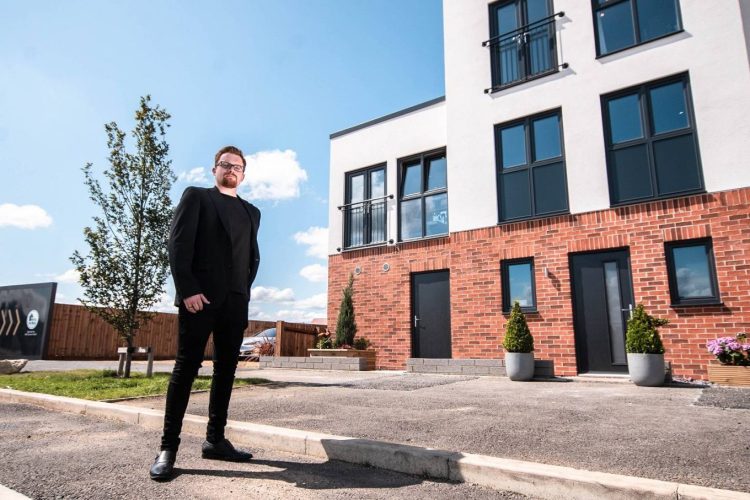Beyond Zero Carbon: Etopia Eco Homes Achieves Energy Efficiency Rating Of 103 Out Of 100

Categories :
- EPC tests confirm that Etopia eco homes coupled with eco technology result in homes that can produce more energy than they use
- First six tested homes effectively prevent 0.525 tonnes of CO2 being emitted into the atmosphere each year
- Finding comes at the same time that air tightness testing reveals the tested Etopia homes perform 10 times better than building regulations require
The first eco homes pioneered by eco MMC housebuilding specialist Etopia to be independently tested for energy efficiency have been officially rated as better than zero carbon. Etopia follows other projects in the rest of Europe, like in Copenhagen.
The first six houses to be constructed at the company’s development, Etopia Corby in Northamptonshire, achieved an Energy Performance Certificate (EPC) score of 103 out of 100 on average, using the Government’s Standard Assessment Procedure (SAP) for energy efficiency.
On average, the homes tested prevent 0.525 tonnes of CO2 being emitted into the atmosphere each year by feeding surplus energy back into the grid, rather than producing CO2 like most homes. This equates to 13.125 tonnes of CO2 removed from the atmosphere during the course of a 25-year mortgage.
Homes that achieve a score of 100 are given an ‘A’ rating under the EPC testing regime. The average UK home achieves an ‘D’ EPC rating and emits 6 tonnes of CO2 each year1 (equivalent to 150 tonnes over 25 years). Using this figure, Etopia has calculated that, over the course of a 25-year mortgage, the tested eco homes would make a positive contribution of 163.125 tonnes of CO2 compared to the average UK house. This is the equivalent of taking a car off the road for 35.5 years, 1,812 hours of flying in a Boeing 7373, or planting 24.5 hardwood trees that continue to remove CO2 from the atmosphere each year. If every one of the 178,790 new build homes completed in England last year were Etopia homes with this level of performance, that would equate to 29.16m tonnes of CO2 being removed from the atmosphere over 25 years — the equivalent of 4.38m hardwood trees.
The highest EPC score achieved at the development so far came when the very first home was tested. It achieved a score of 105, which is equivalent to total annual carbon emissions of -0.7 tonnes.
The tested Etopia homes are located at its 47-unit development in The Avenue at Priors Hall Park — part of the Building for 2050 research project created by the Department for Business, Energy and Industrial Strategy (BEIS).
Etopia can also reveal today that the first house tested has performed TWICE as efficiently as the Passivhaus standard when it comes to air tightness too, an element that contributes massively to its energy performance.
Air tightness tests carried out under the Air Tightness Testing & Measurement Association (ATTMA) procedure establish how well homes conserve energy by measuring the amount of air changes per hour in a property with doors and windows closed, and helping making buildings more sustainable.
Homes meeting the Passivhaus standard must achieve 0.6 air changes per hour at 50 pascals (pa) or less, and the Etopia home can achieve up to 0.3 air changes per hour at 50pa. The Chartered Institution of Building Services Engineers (CIBSE) considers three air changes per hour at 50pa to be best practice — a level of performance that Etopia’s system beats by a factor of 10.
The SAP scoring system was originally developed for the government by the Building Research Establishment (BRE) in 1992 to provide a standardised method of energy efficiency testing for homes. The scoring system allows a like-for-like comparison by making a set of assumptions about occupancy, people’s behaviour and a defined level of comfort.
An earlier report by BRE based on 2001 data from the English Housing Condition Survey found the average SAP score of English homes to be just 50.6 — a rise of 5 points from 1996. Etopia is believed to be the first house builder to deliver a home with an SAP score as high as 105.
Joseph Danels, CEO of Etopia, commented:
“These are phenomenal results for us as an MMC specialist.
“We have designed these homes to smash through the eco ambitions set by national and international bodies. The early evidence is that the team and the build system have excelled themselves and these Etopia homes are setting new benchmarks for our competitors to meet.
“Our system was designed to combine energy, construction and intelligence to provide a truly scalable, green and economically viable building system. Our homes at Corby embody the huge potential of offsite construction and we have proven that modern housing can help tackle climate change while providing the homes of the future that will end the housing crisis. We are setting the benchmark for the three pillars of ESG real estate — environmental, social and governance.
“Our communities in Britain are more ecologically and environmentally aware than they have ever been, and comfortable homes that produce more energy than they need are now an affordable reality.”
Citiesabc was created by a team of global industry leaders, academics and experts to create new solutions, resources, rankings and connections for the world’s top cities and populations.










